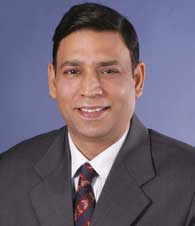|
Executive Interviews: Interview with Anil Bharadwaj on Managing Troubled Times
March 2009
-
By Dr. Nagendra V Chowdary
 Anil Bharadwaj
Anil Bharadwaj Anil Bharadwaj, Secretary General, Federation of Indian, Micro and Small & Medium Enterprises 
But two developments proved
spoiler. The subprime crisis in the
US which later precipitated into a
full-fledged financial crisis. And,
high inflation, particularly in Indian
context. In order to contain inflation,
RBI continuously squeezed money
supply and hiked interest rates
during the last four years. The tipping point came in September this year
when the tap on excess liquidity was
suddenly got closed in the US
markets with the fall of their top
biggest investment bank. Panic spread
across the financial markets in the
world. Indian corporates and banks
which generously tapped these
financialmarkets for
|
|
cheap short-term
funds through ECBs and a wide
range of new age financial
instruments suddenly found the
door firmly shut. They returned to
Indian banks. Frightened, the Indian
banks refused to partwith funds to all
borrowers, big or small. Sectors that were leading growth and
creating employment, started
collapsing one after another: housing,
auto, white goods. Exports started
dwindling due to slump in major
markets. The cascading impact of
these sectors fell on long supply
chains down the line. According to
FISMEís study, there is already an
employment loss to the tune of one
million in these sectors alone. There
is 30% rise in delinquent accounts.
As per RB data, the rise in nonperforming
Assets(NPAs) on-monthto-
month basis has risen from1.6%to
7% among top Indian bankers. And
it is just a beginning. With current
dispensation the rise in NPAs is set to
be alarming. The Indian Prime Minister has
announced a financial package to tide
over the financial crisis. Do you think
that would boost up the industry
morale? What else do you think
needs to be done to revive the
business confidence and get the
economy going again?
The two growth stimulus packages
which have been announced so far
actually composed of steps by RBI
and of Government. I think RBIís
steps have been more decisive than
the Government. The first attack of
the central bank was on tackling the
liquidity crunch. By successively
reducing Repo and Reverse Repo
rates, CRRs and SLRs, it helped injectingmore than three lakh crore in
the system since September last year.
It has taken several steps to create
conditions for banks to lend. The
central Government initiated some
tentative steps towards easing of
problems in housing. From the perspective of SMEs, very
little positive impact has been felt of
these initiatives so far. During the
meeting with the Prime Minister Dr.
Manmohan Singh, FISME asked for
the following:
- Special contra cyclical
measures are required on NPA norms
and clear guidelines on NPA norms
need to be issued
- A moratorium on repayment
of installments for units who are
affected and special dispensation for
SMEs affected by sudden reversals
Immediate steps for ensuring timely
payments fromlarge corporate buyers
to small companies.
- Making the coverage of
Credit Guarantee cover mandatory on
loans upto Rs. 25 lac. Premium of the
guarantee could be born for first year.
- To push banks for lending
further reduction in reverse repo rate
and also reduction in G-Sec 10 year
benchmark yield by at least 200 basis
point
- To augment demand for
MSME products, immediate decision
on 20-25% target of public
procurement for all central
government and central PSUs. The
matter is pending for a long time
- Exports: Big push is needed
for exposing SMEs to exports.
Currently 0.5% of SMEs are engaged
in exports and yet contribute to about
50% of our exports. There is critical
need to look beyond Export
Promotion Councils (EPCs) and
leverage resources of private
organizations and associations
focusing on SMEs.
- While there is case for kickstarting
regulatory reforms in number
of areas which impede
manufacturing, one immediate step could start the process of turning the
tide in favor of manufacturing and
also in its modernization. Income Tax
rates on labor intensive MSMEs may
be fixed at 50% of normal rate. This
will help in capital formation and
growth of this sector as has happened
in IT sector.
1.
Troubled Times Case Study
2. ICMR
Case Collection
3.
Case Study Volumes
|
